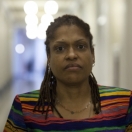
Ed. Note: Champions of Change is a weekly initiative to highlight Americans who are making an impact in their communities and helping our country rise to meet the many challenges of the 21st century.
In the 30 years since the world first became aware of AIDS, a lot has changed. As the communities most affected became less privileged, poorer, darker, more feminine, people living with HIV were increasingly dealing with additional layers of stigma. As the response to AIDS became less inclusive of the people most affected, the people most affected had less capacity to participate or advocate and many were faced with higher priorities as they struggled to support themselves, their families, and to understand what their diagnosis would come to mean for them and for their communities.
We have been through difficult times where we saw ideology and moralizing punditry prioritized above the science of prevention and treatment even while we knew that people were needlessly becoming affected. We have seen a global effort to provide HIV treatment access, around the world, begin to diminish in the context of a great recession. At the same time, we finally have evidence of what many of us intuitively believed all along: access to treatment prevents HIV transmission. We see light at the end of the tunnel.
As a woman living with HIV global advocate, who is both a US citizen and a member of an amazing international network of HIV positive women (ICW), I see a global culture beyond the US that offers many valuable lessons. For example, the proportion of those living with HIV who are women has steadily grown since the beginning of the epidemic. In 1985, women accounted for 8% of new HIV diagnoses while in 2009, women accounted for 25% of those newly diagnosed. Women of color have been particularly affected are significantly more likely to be diagnosed with HIV than their white counterparts.
As we continue to see women’s HIV risk rise within the US, it is important to be able to look outside our borders to understand how globally, women continue to make up the majority of those living with and at risk of HIV. For example, in sub-Saharan Africa, home to the majority of people living with HIV, women compose 60% of the total. When we look around the world, we are able to clearly see that gender inequality, human rights violations, and violence against women are all contributors to women’s risk for HIV and have enormous impacts on quality of life for women living with HIV. These priorities are important for addressing the concerns for women in every region of the world, including our own.
There is now evidence that HIV treatment diminishes infectiousness and has a public health benefit towards reducing HIV transmission. In addition to saving the lives of millions of people living with HIV, we have a unique opportunity to forever change the trajectory of this disease. We know that concern for survival and well-being by those most affected are powerful influences on the policy and programs that impact on the lives of men and women living with HIV. Now, we as a community want an investment in our own powerful motivation to end new transmissions and to achieve universal access to treatment, care, and support.
Domestically, the US needs to continue the reforms to health care to make it sustainable and as useful and productive to our citizens as possible. All of us have a right to health care. We are not a country that will accept people dying in the street because they are poor or old. Change must come from reordering a system that is fundamentally broken and corrupt—fees for services are not working! The call to shift the cost of healthcare to the people that need it, and cannot afford it, while protecting industry profits, in the name of balancing the budget will devastate the health of this country as a whole.
As the affected communities and people in need of health care we must work together. We must respond to what we have in common and identify where our needs and goals we intersect so that we may move forward in a collaborative and mutually supportive way, instead of competing in a fight for attention and resources as individual groups and diseases. We have infrastructures and networks that can engage as a powerful collective for which we need linkage, support and inclusion at all levels. Nothing for us without us!
Beri Hull is the Global Advocacy Officer for the International Community of Women Living with HIV/AIDS (ICW).


